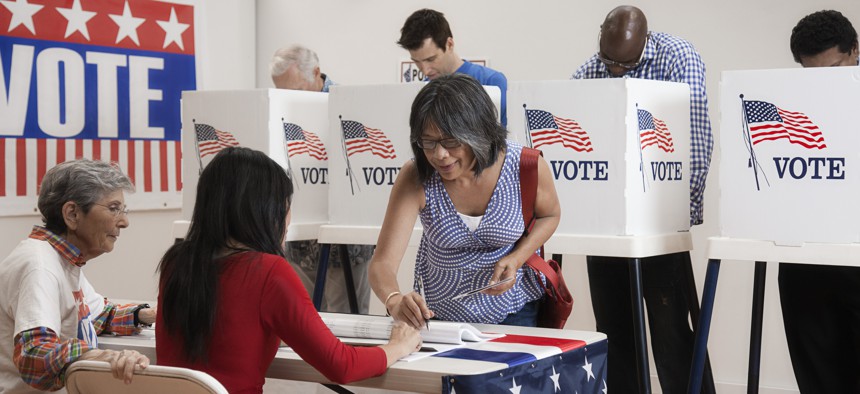Connecting state and local government leaders
Rather than focusing on threats from Russia or China, members of the National Association of State Elections Directors are now working to prevent insider threats.
MADISON, Wis. — Election officials from 33 states, gathered for a conference under tight security, warned that the next few election cycles will be affected by paper shortages and the potential for threats from inside elections offices.
The meeting of the National Association of State Elections Directors last week was held with stringent security precautions, given the ongoing threats and harassment faced by election officials across the country in the years since the 2020 election.
Organizers didn’t publicly share the location of the meeting, and attendees were instructed to keep name badges visible inside the conference rooms, but not to wear them outside the hotel.
NASED executive director Amy Cohen said the group coordinated with federal, state and local law enforcement for the event to protect attendees dealing with serious security concerns.
“Not every one of our members is dealing with the same level of concern, but when you’re all together, it doesn’t matter,” she said. “It’s the transitive property of risk.”
Cohen said she worked closely with a physical security adviser for the Cybersecurity and Infrastructure Security Agency, a federal agency that also sent representatives to the conference to give a presentation for election officials on the resources they have available to help them ensure the security of their election systems.
Insider threats
Inside the meeting, however, election officials focused more time on the potential for insider threats within their offices than risks from the outside.
Judd Choate, the state election director for Colorado, discussed how his state legislature took action to prevent future insider threats after Mesa County Clerk Tina Peters coordinated a scheme to copy election software to prove that the 2020 election was stolen.
“We spent 2017, 2018 and 2019 preparing for the Russians and the Chinese,” he said. “We were more focused on the international threat. Turns out, we had some work to do on the insider” threats.
Following the incident, Colorado’s legislature passed two bills containing four provisions designed to target potential insider threats, including the creation of new criminal penalties for tampering with or gaining unauthorized access to voting equipment and knowingly sharing passwords related to a voting system.
“When someone does it from here on out, it’s a very, very serious crime,” Choate said.
The two laws also place restrictions on the unauthorized copying of ballot machine hard drives and limit access to election equipment. They also prevent people from serving as designated election officials if they’ve been convicted of partaking in a conspiracy to commit sedition, insurrection or treason, or to overthrow the government.
Elections officials from other states took note. Nicholas Meyers, the elections program administrator from Louisiana, said he sent Choate’s presentation slides to others in the secretary of state’s office.
“As much as there’s noise about outside, the insider threat is very real,” Meyers said. “The insider threat is way more real than other threats that are perpetrated.”
Amanda Grandjean, Ohio’s director of elections, lamented that Ohio’s Republican-controlled legislature isn’t amenable to similar proposals. Meyers also said he’s not sure if his Republican-controlled legislature would be open to similar reform.
“We have a very different make-up of our legislature than Colorado,” he said.
Paper shortage
Many election officials, though, said their primary concern heading into the November midterm election and with 2024 looming is supply chain issues causing paper shortages.
During a panel discussion on supply chain disruptions, Jim Suver, co-chair of the supply chain working group at the federal Sector Coordinating Council, explained how U.S. and Canadian paper mills have been closing over the last decade. Increased demand for packaging cardboard due to increased online sales means that fewer mills are producing the paper necessary for ballots, ballot envelopes and even “I Voted” stickers.
The pandemic has only exacerbated the problem, as states allowed more voters to cast ballots by mail, requiring more paper.
“We never anticipated this type of crunch to happen when mills were making decisions in 2020,” Suver said. He said the current paper supply is the leanest it’s ever been, and the problem is unlikely to be solved before the 2024 election.
Election officials said they’re worried that it will be difficult to reprint ballots or any of the paper goods that accompany a ballot at the last minute, but state election law often changes in the months or weeks leading up to an election, necessitating reprints.
Supply chain issues are also causing shortages of election hardware, said Ed Smith of the Sector Coordinating Council. He recommended states and localities order their supplies early and anticipate delays.
Virginia Mercury is part of States Newsroom, a network of news bureaus supported by grants and a coalition of donors as a 501c(3) public charity. Virginia Mercury maintains editorial independence. Contact Editor Sarah Vogelsong for questions: info@virginiamercury.com. Follow Virginia Mercury on Facebook and Twitter.
This story was republished under Creative Commons license CC BY-NC-ND 4.0.



